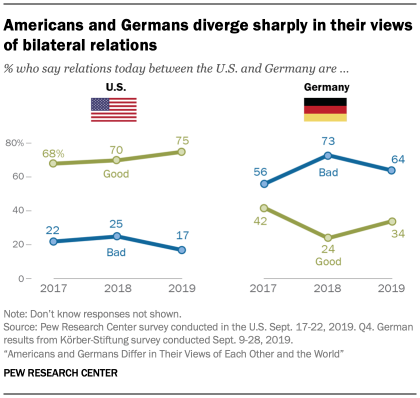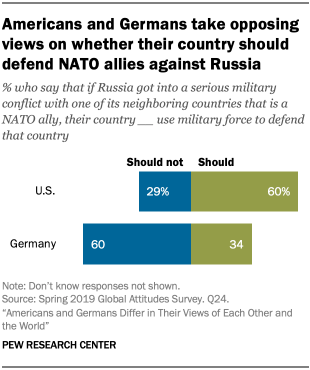According to a recent survey, Americans and Germans share sharply divided views of each other, with defense spending and security issues regarded as the most differentiating of all.
As published by the US-based think tank Pew Research Center, the American-German bilateral relationship has led to diverse views of the 45th President of the United States and the Chancellor of Germany.
“There continues to be a wide divergence in views of bilateral relations and security policy between the publics of both countries,” the survey’s authors explained. “Political divides on both sides of the Atlantic continue to shape attitudes about relations with other nations, perceptions about defense spending and Americans’ and Germans’ views of each other.”
Throughout 2019, at the time of the survey, both countries were more optimistic regarding the state of bilateral relations. However, on issues regarding military use, obligations under NATO, and ties between Eastern powers like China and Russia, both nations remained aloofed.

In the survey, more than 1,000 adult participants from the U.S. and another 1,000 participants from Germany were tasked to share their input on the bilateralistic attitudes of both nations. Of the sample size, 58% leaned more Democratic in views, while 42% Republican or conservative.
“Despite these divergences in opinion, young people in both countries have more positive views of the U.S.-German relationship.”
Among the American correspondents, three-quarters were in accordance on the current state of relations being positive. Meanwhile, only 34% of Germans perceived the bilateral relations as positive. 2% stated the relations were outstanding.
When taking into account age groups, the survey found that younger adults were more likely to rate the bilateral relations as positive compared to the mid-adult or older adult population.
Moreover, differentiating views of both nations, based on the respondents, relied on their views of defense budgeting and the use of military intervention.
For instance, the participants were asked for their stance on the defensive actions of NATO allies in the event of potential aggression from Russian military forces. Most respondents shared contrasting views of such security issues among each other, including Article 5 obligations under NATO policies.

“Americans are also more likely than Germans to say it is sometimes necessary to use military force. About eight-in-ten Americans believe it is sometimes necessary to use force to maintain order in the world, yet only about half of Germans agree,” the survey determined.
On the question of defense spending, fewer American respondents belive European allies should increase national defense spending, while Germans are divided on whether to increase or maintain budgets.
“Germans view their country’s defense spending differently. The public is divided on whether to increase or maintain current levels of spending on national defense, with about four-in-ten taking each view.”
“In both countries, relatively few believe Europeans are spending too much on national defense, and that share has remained fairly stable since 2017.”
Pew Research Center, founded in the United States, is a nonpartisan think tank devoted to public opinion polling, demographic analysis, and social science research.


